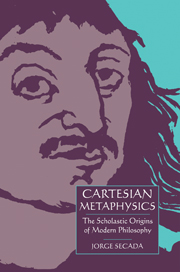Book contents
- Frontmatter
- Contents
- Preface
- Abbreviations
- Prologue
- Part I The unity of Cartesian metaphysics
- 1 Descartes's essentialist metaphysics
- 2 Scepticism, Scholasticism, and the origins of Descartes's philosophy
- 3 Cartesian real essences
- Part II Ideas and the road from essence to existence
- Part III Cartesian substances
- Epilogue
- Notes
- References
- Index
3 - Cartesian real essences
Published online by Cambridge University Press: 22 September 2009
- Frontmatter
- Contents
- Preface
- Abbreviations
- Prologue
- Part I The unity of Cartesian metaphysics
- 1 Descartes's essentialist metaphysics
- 2 Scepticism, Scholasticism, and the origins of Descartes's philosophy
- 3 Cartesian real essences
- Part II Ideas and the road from essence to existence
- Part III Cartesian substances
- Epilogue
- Notes
- References
- Index
Summary
Real essences
Commentators have emphasized the role of scepticism and of scientific inquiry within Descartes's thought. This has helped obscure the influence on his metaphysics of Aristotelian Scholasticism and of Christian Platonism. But, as I have argued in the last two chapters, we cannot properly understand the function of sceptical arguments and methodical doubt in the Cartesian metaphysics, if we ignore the Scholastic philosophy against which it was reacting and which it was designed to replace. The issue is not about the diverse influences on Descartes or their relative importance. It is well known that these include Renaissance scepticism and the developments in the natural sciences which took place in the two centuries preceding his birth and during his own life. Given the pivotal place of subjectivity and its epistemological concerns in post-Cartesian philosophy and the immense success of scientific research in the last three centuries, it is not surprising that when we look back at Descartes's works we should be forcefully impressed by the extent to which he influenced and determined these developments. But both for historical and for philosophical reasons it is to our advantage not to see him as a mere image of ourselves.
I stress Descartes's relation to St Thomas and the sixteenth-century Jesuit Scholastics not to belittle the significance of his own original insights nor to negate the evident importance of his scientific and epistemological contributions and the full historical context from which they originated.
Information
- Type
- Chapter
- Information
- Cartesian MetaphysicsThe Scholastic Origins of Modern Philosophy, pp. 55 - 74Publisher: Cambridge University PressPrint publication year: 2000
